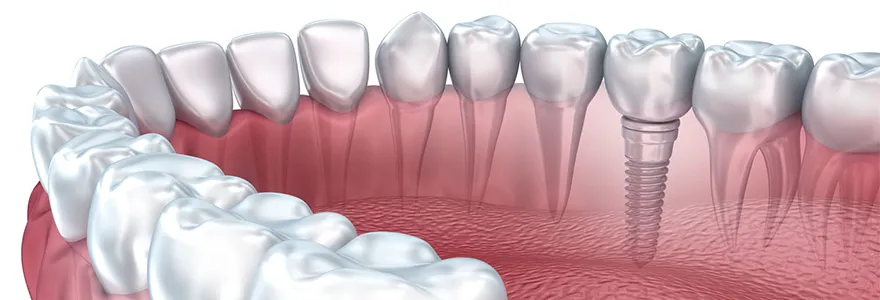What are Dental Implants?
Dental implants are an option to restore missing teeth without using additional teeth as support or anchors. They are also able to support dentures and prevent difficulties associated with the slipping and shifting of the denture. Implants are surgically placed in the jawbone and mimic the root of the natural tooth which also prevents bone reduction. Dental implants are restored with crowns, bridges and dentures.
Why get dental implants restore missing or damaged teeth?
-
A dental implant restores a lost tooth so that it looks, feels, fits and functions like a natural tooth.
-
Dental implants allow you to maintain the natural shape of your face and smile.
- Leaving empty spaces in your mouth after losing one or more teeth can lead to additional health issues, such as the loss and deterioration of some of your jawbone. When it is not being used to support a natural tooth, the jawbone deteriorates, losing its strength and firmness. Dental implants may preserve and stimulate natural bone, actually helping to stimulate bone growth and prevent bone loss.
-
Cavities can’t occur in an implant-restored crown, or replacement tooth; however, you will need to visit your dentist as scheduled and clean and care for it and your gums and mouth every day, the same as you would if it were a natural tooth.
-
Dental implants are fixed in place and fuse naturally with your jawbone, meaning your replacement teeth won’t move, click or shift.
-
Dental implants go in the jawbone, in the spot where your missing tooth root was, without impacting healthy teeth. They also help prevent healthy, adjacent teeth from shifting as they would if an empty space were left for an extended period of time.
In most cases, anyone healthy enough to undergo a routine dental extraction or oral surgery can be considered for a dental implant. Heavy smokers, people suffering from uncontrolled chronic disorders – such as diabetes or heart disease – or patients who have had radiation therapy to the head/neck area need to be evaluated on an individual basis. You should consider the fact that it is a surgical procedure so there are always risks present with any surgery i.e delayed healing, prolonged bleeding, infection, surgical complication. There is also a significant time commitment required as the implant site may need to have additional procedures performed to make it ready to accept the implant. If you are considering dental implants, talk to your dentist to see if they are right for you.

